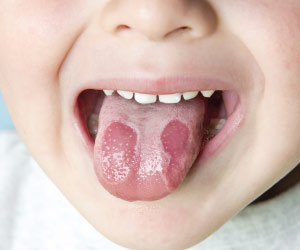Geographic Tongue
No Cause For Alarm
Dear Doctor,
I get red patches on my tongue from time to time, which are mildly irritating, but don’t really bother me. My dentist says it’s probably “geographic tongue.” Sounds odd — can you tell me more?

Dear Larry,
It’s not surprising that geographic tongue may sound odd, because it only affects one to three percent of the population. A lot of people just don’t know about it, because, as you say, it doesn’t bother them even if they have it.
Geographic tongue is actually a condition that gets its name from a map-like pattern of patches that form on the tongue in affected persons. These patches resemble little islands of redness on the dorsum (top or surface) of the tongue, and are surrounded by grayish white borders. The most common clinical name for geographic tongue is “benign migratory glossitis” (“glossus” – tongue; “itis” – inflammation). Benign means that it is not cancerous; it is also not contagious. The patches actually also appear to migrate or move around and are caused by a temporary loss of the tiny bumps, called papillae, which make up the tongue’s grainy upper surface. The patches on the tongue appear flat in affected areas. They may disappear and reappear over a short time period ranging from hours to days, and can also change in both size and shape.
Typically, geographic tongue is not painful, but your tongue may be a little sensitive, burn or sting, or feel irritated as you describe. Occasionally some individuals with the condition may experience numbness.
Geographic tongue often runs in families, and although it can occur at any age, it tends to affect mostly middle-aged adults. It occurs more often in non-smokers and in women during hormonal fluctuations, such as ovulation and/or pregnancy. Individuals with fissured tongues (deep grooves on the tongue’s surface) are also more likely to have the condition.
Causes And Aggravating Factors
Several factors have been proposed as possible triggers including emotional stress, psychological issues and hormonal disturbances. However, none of these factors have been conclusively linked to it. Zinc or vitamin B deficiencies may also be a factor in those affected. In addition, a relationship has been reported between geographic tongue and psoriasis (a common skin condition characterized by patchy redness and scaling). They share a microscopic similarity and an increase in prevalence when they occur together in those affected.
Foods with high levels of acidity, such as tomatoes and citrus fruits, tend to aggravate geographic tongue, as do eggplant, mint, and hot and spicy foods. Astringent substances, such as alcohol or mouthwashes, are also irritants that can aggravate it.
Helpful Aids
While there is no cure, treatment is usually unnecessary. In those who are experiencing any pain, it is advisable to see a dentist. He/she may prescribe anesthetic mouthrinses, antihistamines, steroid ointments or other similar treatments to manage the discomfort.
Now that you know more about so-called geographic tongue, I hope that any concerns you may have had are allayed. The good news is that it is harmless, and there is nothing for you to worry about.

